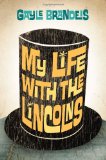For some reason books set in the 60’s are fairly prevalent on this year’s Cybils Middle Grade nomination list. It’s an exciting time period with issues of race and gender equality right on the forefront, which tends to meld well with the coming of age/self-awareness theme.
I really enjoyed each of these books, and would recommend each of them to an older middle grade reader.
My Life with the Lincolns by Gayle Brandeis is set in the Chicago suburbs. There’s a lot going on in this novel. Sixth-grader Mina Edelman is convinced that her family is the Lincolns, reincarnated, and she feels that it’s her responsibility to save him from the same fate as the former president suffered. She, Wilhelmina, could be William, whose death in his 12th year ended up contributing to his mother’s loss of sanity, so she is also trying hard to stay alive herself.
This part of the book is a bit “out there,” but told with the innocence of an overactive imagination, it fits right in to showing Mina as a quirky individual. She and her father get involved with Martin Luther King’s equal housing movement in Chicago, and everything changes. She gets to know her father better, and she begins to understand herself better, too. I often wonder how easy it is for today’s youth to understand this struggle, but what makes this a book that is even more relevant for today is that in spite of the setting during an important time in history, Mina is just a regular girl. She’s squabbles with her older sister, she is scared by her parent’s marital troubles, she is confused by the onset of puberty. Brandeis presents it all in a very timely, age-appropriate, innocent and realistic way that goes beyond stereotypes.
I listened to the audio from Listening Library, and it was a great rendition. It’s hard for a narrator to read a book that is from the perspective of tween, but Emily Janice Card did a good job with this one.
The Private Thoughts of Amelia E. Rye by Bonnie Shimko also looks at race and class. Amelia is poor, her mother is much older than her peers’, and she doesn’t really fit in, but she learns firsthand that her grandfather’s adage is true: All a person needs in life is one true friend. That friend for Amelia comes when Fancy moves into town with her mother. Fancy is the first African American person Amelia has ever seen, and the fact that they are both outcasts brings them together quickly. Although Fancy is disliked and misunderstood because of the color of her skin, the story of being bullied or ignored feels timeless. And Fancy is a girl with courage and a great sense of self. Amelia is truly changed by knowing her, and I grew to love both of them. Amelia is a little bit of a smart aleck in her writing, but after all, this is supposed to be her “private thoughts.” In fact, she even warns readers at the beginning that if they don’t like cussing (she throws in a few mild swear words) they shouldn’t even read it.
Set in the turbulent mid-60’s, this is a story about fitting in and how a good friend helps you find yourself.
 Saint Training by Elizabeth Fixmer touches lightly on race, and specifically the involvement of the Catholic clergy in civil rights, but it looks more at other issues of that time: women’s rights and the Vietnam war.
Saint Training by Elizabeth Fixmer touches lightly on race, and specifically the involvement of the Catholic clergy in civil rights, but it looks more at other issues of that time: women’s rights and the Vietnam war.
Mary Clare is one of nine children, with another on the way. Though she’s only 12, she helps with her siblings and with the household a great deal, especially when her mother decides to go to work, which is frowned upon by the community. She knows that her parents are having financial troubles, and that another baby will be an additional strain, financially and emotionally. She begins writing the Mother Superior at a nearby convent, wondering what she might need to do to get ready to become a nun. She thinks that if she’s extra good, all her family’s trouble will disappear. She and Mother Monica begin a delightful correspondence in which Mary Clare ends up finding many answers about her thoughts on pacifism, women’s rights, civil rights, and vocation.
This book doesn’t have any objectionable content (swearing etc), however there is mature content in the way of the Vietnam war, and there is an allusion to marijuana usage by her older brother.
I already reviewed One Crazy Summer, which is also set in the late 60’s and takes a look at even another perspective (linked to my review).
Check out our current giveaways. Subscribe to our feed. Follow us @5M4B on Twitter.
Jennifer Donovan hasn’t read a book for grownups in weeks and weeks since tackling the Cybils nominees. As evidenced from the above list, she’s not really missing out. She blogs at Snapshot (when she’s not over her head trying to get through more than 150 middle grade novels which she can’t even find the time to review here).
Interesting stuff here– fiction can certainly make a topic more interesting for some readers who might not otherwise be interested in this time period.